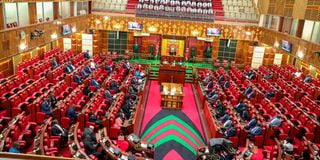Premium
Why MPs want tougher rules for foreign envoy jobs

A past sitting at the National Assembly.
What you need to know:
- To avoid embarrassing the country and the President by people turning down ambassadorial appointments, the lawmakers called on the Head of Public Service Felix Koskei to do wide consultations before any name is gazetted.
- The lawmakers said the move by former ICT Cabinet Secretary Margaret Nyambura to decline her nomination as Kenya's ambassador to Ghana was an embarrassment to the President and created unnecessary tension.
Members of Parliament have called on the Ministry of Foreign Affairs to tighten the requirements for the appointment of persons as ambassadors, high commissioners, or consul-generals to promote Kenya’s interests.
While approving recent envoys nominated by President William Ruto as ambassadors and high commissioners, the lawmakers said there is a need to tighten the requirements as the country moves to improve its foreign policy.
Among the requirements that MPs want future envoys to have is the ability to speak the language of the country they have been nominated to serve in.
The lawmakers argued that there is no way an individual can effectively champion Kenya’s economic and political interests without having a command of the language of the country is serving.
The MPs pointed out that most individuals appointed have no knowledge of the country they have been posted to thereby ending up spending close to two years learning the language, a factor they say is a waste of time that can be avoided at the appointment level.
Eldas MP Adan Keynan said a person appointed as an ambassador or high commissioner is an interface between the host country and Kenya hence linguistic preparedness should be a basic requirement.
“Other than the education qualifications, there are basic things that we fail to appreciate. Linguistic preparedness is very important because when you are assigned, you are an intelligence officer, you are an economic and political representative and therefore knowing the language of the country you are expected to serve is important,” Mr Keynan said.
He added: “If you are posted to a Portuguese-speaking country, you must have the basics (of the language). If you are also going to be posted to China, you must have the basics otherwise you will waste about two years trying to catch up and by then your tour of duty will have come to an end and you’ll have achieved nothing.”
Kilgoris MP Julius Sunkuli said the duty of an ambassador is to communicate the interest of the mother country, meaning effective communication skills in the foreign language should be an important consideration in the forthcoming appointments of the envoys.
“I find communication as one thing that is being omitted or ignored anytime ambassadors are being appointed and vetted. That you are going to a Portuguese-speaking country and can’t speak Portuguese, or are nominated to serve in a French-speaking country and can’t speak French — it does not happen in other countries,” Mr Sunkuli said.
He added: “In the future, as we draft the foreign policy, let us take that into consideration so that we can appoint people who are fit for purpose.”
Further, the lawmakers also want individuals appointed as envoys to be career ambassadors who understand how the diplomatic circle works.
Although the appointment of such envoys is normally the prerogative of the President, such individuals are supposed to have basic qualifications such as being Kenyan citizens while for ambassadors and high commissioners, the Foreign Service Act requires that they don’t hold foreign passports or must renounce them on appointment.
To avoid embarrassing the country and the President by people turning down ambassadorial appointments, the lawmakers called on the Head of Public Service Felix Koskei to do wide consultations before any name is gazetted.
The lawmakers said the move by former ICT Cabinet Secretary Margaret Nyambura to decline her nomination as Kenya's ambassador to Ghana was an embarrassment to the President and created unnecessary tension.
Chairman of the Defence and Foreign Relation Committee, Nelson Koech, said there are trained career diplomats at the Ministry of Foreign Affairs, who have been stagnant at their positions and are willing to take up such positions to diligently serve the country.
“My committee is getting frustrated, especially when it comes to countries that we have had relatively good relations like Ghana. I know most of these appointments are done by the President but they are done in consultation with the Ministry of Foreign Affairs. In the future, let’s not give positions to people who are not interested,” Mr Koech said.
He added: “In the future, the ministry and the public service should not waste the committee’s time by appointing officers who are not interested.”
Minority leader Junet Mohamed said the Executive should do due diligence before deciding to give someone a job.
“There are many Kenyans that are qualified and are looking for jobs. We should not be begging people for jobs when many Kenyans are looking for such opportunities,” Mr Mohamed said.
Gilgil MP Martha Wangari said it is important that the Head of Public Service does proper consultation with the appointing authority to ensure that if someone is not ready to take up an appointment, it is rejected at the right time before a gazette notice is published.





